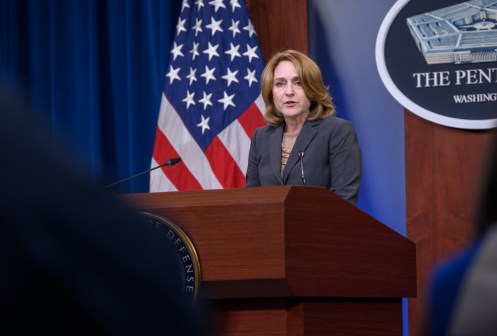DOD must make smarter investments in 2023 budget, says Rep. Adam Smith

With a highly dynamic strategic environment and adversaries seeking to change the world order, the fiscal 2023 budget will be the most impactful and important of the last 25 years for the Department of Defense, according to the chairman of the House Armed Services Committee.
And as the U.S. is figuring out its role and how to brush back revisionist adversaries and competitors, it must be thoughtful about building and investing in its military, Rep. Adam Smith, D-Wash., said in an appearance Thursday at the American Enterprise Institute.
The U.S. cannot afford the types of large military build-ups that occurred during the Cold War against the Soviet Union. As a result, it must be smarter about investments and put more stock into emerging technologies.
“When you’re thinking about how we need to change the force, think about two things: information and survivability,” Smith said. “Those are the two keys. The ability to move information quickly, get it to the person who needs it the most in real-time and to protect that information infrastructure.”
The DOD is currently trying to transform the way it conducts warfare with a new concept dubbed Joint All Domain Command and Control, which seeks to more seamlessly connect sensor information to shooters to allow for faster decision-making.
On the survivability piece, Smith noted that the force cannot be so vulnerable as to be crippled by cyberattacks and anti-satellite strikes that eliminate command and control and the ability to share information.
He noted that in challenging other world powers that seek to upend international order, the military’s crucial role will be deterrence.
“Deterrence matters. I think when you look at Ukraine, if Putin had thought that he couldn’t do what he’s doing right now, if Ukraine had had a more robust military, he wouldn’t be doing it,” Smith said. “As we look at the other nations in Eastern Europe as a starting point, the Baltics, Poland, Romania, shoring up our NATO responsibilities, deterrence is one way to keep peace in the world.”
New technologies, such as artificial intelligence and even drones, can play a huge part in that deterrence. Smith cited how small and inexpensive drones have turned the tide in recent conflicts, pointing specifically to Ethiopia’s civil war in which the government used small drones to gain control back from rebels seeking to overthrow it.
“That type of use of new technology is going to be the key to deterrence,” he said. “If China thinks that we have the ability to protect our systems and to be survivable and to make their systems vulnerable, that’s the best deterrence we can have. It’s not just a matter of building a lot of things, we have to make sure that those things meet the technological challenges of today’s warfare.”
When it comes to an actual number for the 2023 budget, Smith said he hasn’t landed on an exact number yet, but acknowledged it has to be bigger than previously thought.
“The Russian invasion of Ukraine fundamentally altered what our national security posture, what our defense posture needs to be. It made it more complicated and it made it more expensive,” he said.






